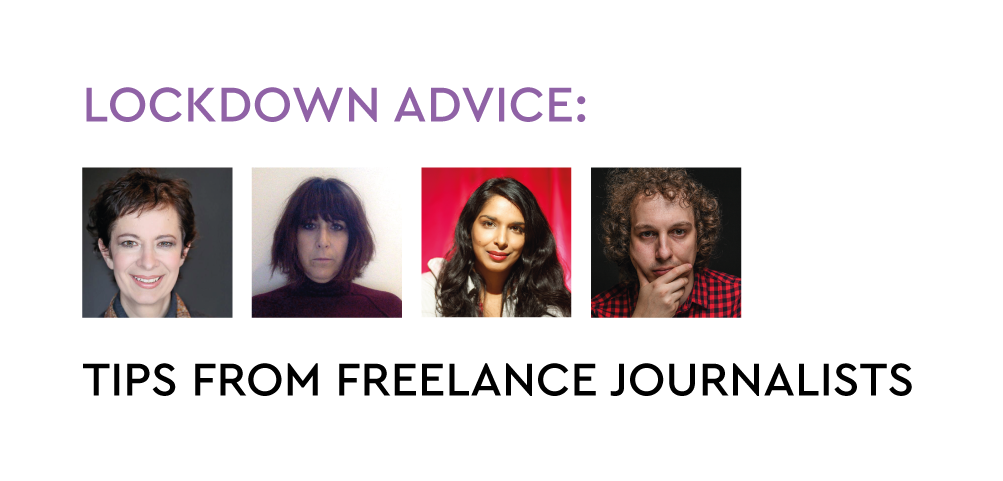KEEPING SANE & SOLVENT: FREELANCE JOURNALISTS

Our third helping of lockdown stories and advice focuses on the experiences of freelance journalists around the country.
 KATIE JARVIS
KATIE JARVIS
Like many freelancers working from home, I’m well used to fighting for a quiet corner for even ten blissful minutes. I’m used to explaining, “I know you only asked a quick question but I’ve lost my complete train of thought.” But in our household, we’ve a police officer (eldest son) working difficult shifts; while our youngest is an on-call firefighter. Next to frontline workers, my job writing magazine features suddenly doesn’t feel quite so key.
However quiet a space or not, I still need to earn. My commissions haven’t (yet) dried up but the real challenge has been getting hold of people. Book tours, festivals, theatre productions – so many avenues for finding interviews to pitch – have evaporated. I feel for the artists; I selfishly miss my theatre reviews. In times such as these, we need the consolations of culture more than ever.
Once I have secured an interview, the next challenge comes in the form of once-simple, now arcane matters – sourcing photographs, and even checking publishing details. Taken-for-granted minutiae have transformed into tricky fundamentals that can demand the ingenuity of Poirot and the (unpaid) patience of a saint.
The worst aspect is the uncertainty. Will publications I write for continue to attract advertising? Will hassled shoppers, searching for eggs, bother to grab a magazine?
But here’s the thing. Having rightly denigrated my featuring-writing in favour of frontline work, I’ve also been reminded of the simple power of words. In my community, selfless volunteers are making PPE. I can’t sew, but I have been freely giving time to promoting their efforts in local media. With humble gratitude.
Katie Jarvis is a freelance journalist based in the Cotswolds, writing for lifestyle and regional magazines. @katiejarvis
 CHRIS STOKEL-WALKER
CHRIS STOKEL-WALKER
I’ve continued pitching throughout the pandemic, realising that there’s still a need for stories to be told – both about the virus and about other things – as light relief. Lots of publications have started tightening their belts, making the success rate of pitches far lower, and that, coupled with the addition of a raft of new writers joining the freelance world as publications cut permanent staff numbers to the bone, means it’s harder than ever. Around 80% of the stories I’m writing are related to coronavirus in some way, and it’s just about finding the ideas that staff writers are too busy to cover themselves and thinking ahead about what’s coming next. That’s understandably difficult in a never-before-seen pandemic like this. But I’ve found, and have been extremely grateful for, editors sticking by me and continuing to let me work.
More than ever, the qualities that make a freelancer successful are important: be polite, nice, dependable, reliable – and produce clean copy. Some of the people I see struggling most are those who have burned bridges and suddenly found the few editors they’d kept in their favour are furloughed or fired.
Chris Stokel-Walker is a freelance journalist for Wired, The Guardian, The Economist and the BBC, living in Newcastle. He’s always eager to write more, and is the author of YouTubers: How YouTube Shook Up TV and Created a New Generation of Stars (Canbury Press, 2019). @stokel
 ANNE JOSEPH
ANNE JOSEPH
From a working from home perspective, lockdown has mostly been no different. As a freelance journalist, I pitch ideas to editors, or they approach me. I write about arts and culture for UK nationals and the Jewish press here and internationally and, initially, I had a reasonable flow of work to juggle, alongside adapting to a sudden full house of four adults. Sharing my territory and accepting the never-ending use of all types of coffee receptacles, often left in the kitchen sink by my newly acquired ‘colleagues’, were the most immediate and pressing work challenges. Pretty soon, however, the profound and devastating effect Covid-19 was having on the arts and, in turn, arts coverage, became apparent.
Thankfully, the impact on me was relatively slow. An interview with a film director whose film was scheduled for release in late March was pushed back, to who knows when. Another interview, with an artist-writer whose press preview I had attended shortly before lockdown, was affected as the museum closed soon after the exhibition opened. My editor and I agreed it made sense to postpone the piece until the museum reopened. Then came the shattering announcement that one of the papers I contribute to was going into liquidation. But, in what is a remarkable and happy turn of events, a successful rescue plan has now been put in place, ensuring the paper’s long-term future.
Cultural institutions have tried to adapt to how they are providing content to their audiences, meaning that I have had to adjust my thinking about what I pitch. The golden age of streaming has created new opportunities, but, and it’s a big but, one format cannot provide sufficient variety and coming up with fresh ideas is an ongoing challenge. All this in an environment in which some papers have been less receptive to pitches because space is currently at a premium.
Like everyone else, I long to get out and experience culture beyond my laptop screen but, until then, there’s a lot of scrolling through various online festival programmes for ideas and perhaps lockdown will be the catalyst to finally get me writing that book.
Anne Joseph is a freelance journalist, who writes mainly about Jewish arts and culture. She contributes to The Jewish Chronicle, The Times of Israel, The Times and The Guardian. Her work has also appeared in the Forward, TLS and other publications. @1annejoseph
 ANITA SETHI
ANITA SETHI
I haven’t been pitching many articles during the pandemic, as luckily I had a writing deadline of 30 April (for a currently top-secret project), which coincided with the first month of lockdown. Now I’ve met that deadline, I am turning my attention again to journalism.
Of course everyone is struggling with concentration right now and it is has been hard to tear the mind away from the horror and brutality of our times. I’ve had insomnia since childhood and that has intensified during lockdown. As well as journalism, a proportion of my freelance income was from speaking at events including chairing, and with these cancelled, like many others I have felt the loss and have lain awake worrying about how to pay the rent. Deeper structural inequalities of class have been exposed by the pandemic; the difference between those with a safe and stable home and those in precarious rented accommodation like myself, for example.
Like many industries, journalism is suffering and ironically we need it more than ever as Trump attacks so-called ‘Fake News’. My early career coincided with the major recession of 2008/9 and I remember how awful it was, and I did not think I’d live to see anything like it. It will be a test of resilience for all, though those from minority backgrounds are being disproportionately affected by the pandemic in many ways.
I was lucky in receiving a small grant from the Society of Authors from the Authors’ Emergency Fund for which I was very grateful, and an even smaller grant from the government’s self-employed scheme – however, that barely covered a month’s living. It’s clear that the government has not respected or valued freelancers as much as they have staff. Freelancers were the last to be offered any kind of support and many slipped through the cracks. It’s the most vulnerable in society who should be protected first and foremost but in the crisis they have been the last in line. I hope the world can be rebuilt from the wreckage to be a more equal place where all are valued.
Anita Sethi is a writer, journalist and critic from Manchester. She has been published in several anthologies and been a judge of prizes including the Society of Authors’ Awards and Costa Book Awards. She has interviewed many writers, artists and musicians and appeared at festivals around the world. @anitasethi/www.anitasethi.com
TIM DAWSON
Six months ago, Steve’s career was taking off. Four years after joining a regional newspaper, he moved to London to work shifts on the nationals. An accomplished news gatherer, he sometimes worked six days a week. The money is not great, given how demanding news shifts are – £130 to £200 a day. But every week he filled our biggest-selling papers with stories.
Then came Covid. “My regular shifts disappeared. The papers scaled back, and staff stopped taking holidays,” Steve* says.
Chancellor Rishi Sunak’s Self-Employment Income Support Scheme (SEISS) provided short-lived hope, quickly dashed by its small print. Because Steve pays tax PAYE (HMRC requires newspapers to collect tax from freelances), he is ineligible for support. The papers could technically have furloughed him – but they took the easier step of offering no work.
His case is not unusual. A survey of National Union of Journalists (NUJ) freelances found that 13% were in a similar situation. A further 17% were ineligible for support because they work through companies, and 5% are ineligible because they work though limited partnerships. Most media freelances use such arrangements because they are a client requirement.
Steve came to me because I am the welfare officer of the NUJ’s London Freelance Branch. He is one of unprecedented volume of members that I have guided through the application process to obtain support from NUJ Extra, our union’s benevolent charity.
For those that SEISS has helped, it has been a lifeline. Nearly a third of media freelances have been excluded, however, despite being relatively low paid and having no choice about the terms of their engagement with major publishers and broadcasters.
The NUJ has raised this repeatedly in its regular meetings with government ministers and co-ordinated a cross-party campaign for revisions to the scheme. For change to come, however, everyone affected by this scheme’s shortcomings should seek out their MP to complain – form letters are available from the NUJ. Unless they do so, many freelances will be forever forgotten when it comes to state aid.
*Steve’s name has been changed.
Tim Dawson is a freelance journalist, a member of the NUJ’s national executive and a past president of the union. @timdawsn
We’re still calling on ALCS members to contact their MPs and share the proposals ALCS has developed to improve the Self-Employment Income Support Scheme (SEISS) set out by the Government that is designed to support self-employed and freelance workers. Find out more about our campaign and take part.
